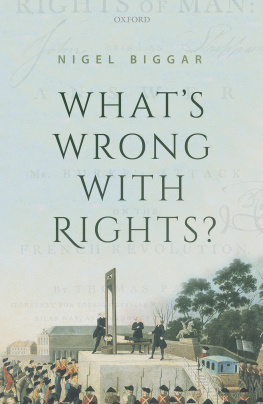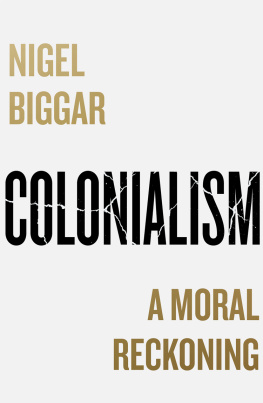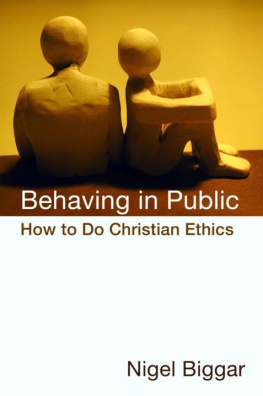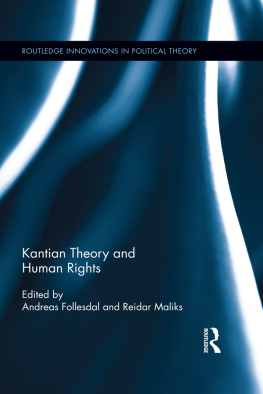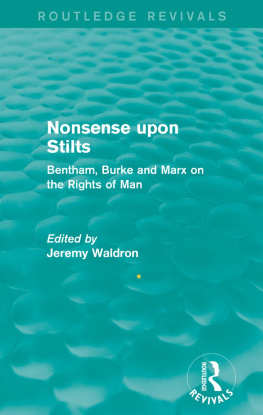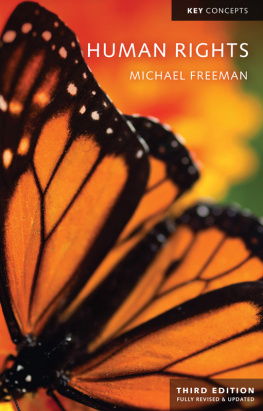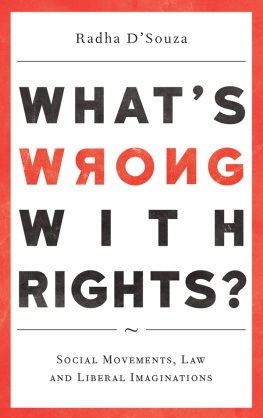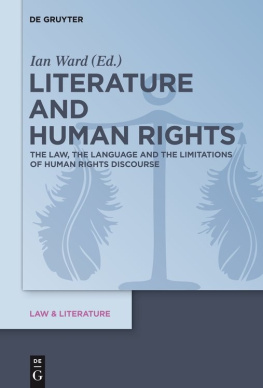Praise for Whats Wrong with Rights
This scholarly, but nonetheless most readable, book makes an important contribution to the debate about to be had when the UK government takes forward its promised (some would say threatened) new Commission on the Constitution, Democracy and Human Rights. No stranger to controversy, Professor Biggar argues in effect that the assertion of human rights has got out of hand. He pulls no punches and takes no prisoners. This is a penetrating examination of the relationship between rights and responsibilities and reflects many of the concerns expressed in Jonathan Sumptions 2019 Reith Lectures.
Lord Simon Brown of Eaton-under-Heywood, former Justice of the Supreme Court of the UK
Whats Wrong With Rights? is one of the most remarkable scholarly achievements I know of: it deftly addresses a wide variety of theoretical and practical problems of great normative importance; it engages with a vast and complex legal, philosophical, and theological literature about the morality of rights; it articulates plausible assessments of the most important contributions to that literature; and perhaps most importantly, the topics it addresses are at the very heart of political discourse in contemporary liberal polities. I cannot recommend it more highly.
Christopher Eberle, Professor of Philosophy at the United States Naval Academy, Annapolis
With the noble post-World War II human rights project increasingly imperiled by misunderstanding and manipulation, Nigel Biggars new book is a major contribution to clear thinking about what we mean when we speak of rights. Whether or not they agree with his conclusions, friends of human rights everywhere should welcome this timely and informative analysis of whats wrong with rights and what needs to be done to put them right.
Mary Ann Glendon, Learned Hand Professor of Law at Harvard University and author of Rights Talk (1991)
Despite its eye-catching title, this book is neither a rejection of rights as such nor of natural morality, but a keen-eyed critique of natural rights in particular. In a discussion both dazzlingly wide-ranging and compellingly concrete, Nigel Biggar shows how natural rights talk undermines appropriate acknowledgement of the contingent, circumstantial character of political and ethical judgments. We do well to recognize that rights are paradigmatically legal and enrich ethical discourse by attending to virtues and duties as much as to rights. Whats Wrong with Rights is the most significant Christian ethical contribution to reflection on rights since Nicholas Wolterstorffs Justice:Rights and Wrongs.
Jennifer Herdt, Gilbert L. Stark Professor of Christian Ethics at Yale Divinity School
Whats Wrong With Rights? is magisterial, combining theology, intellectual history, and detailed attention to particular cases and examples. Rights are, in fact, esteemed highly by Biggar, but only when they are allowed to function properly, by being placed within a more capacious framework, not itself limited to the notion of individual and competing rights. Morality properly operates with a plenitude of concepts, where rights emerge as the conclusion, rather than being the premises and first principles. What is needed is attention to the particularity of circumstances, against the widest possible view of human flourishing and its constitutive goods. The writing is clear, passionate, energetic, and vivid. Biggar is not afraid of making controversial judgements and works towards them in a manner that is honest and transparent, always commanding respect. At a deeper level, his book invites the reader to engage in debates about rights, maybe to disagree, but to do so from within a richer moral tradition, which actually gives more opportunity for insight, nuance, and dissent. The possibility arises of not only better judgements, but better disagreements. Both robust and generous, this landmark book represents a leading theological ethicist writing at the height of his powers.
Christopher Insole, Professor of Philosophical Theology and Ethics at Durham University
Rights talk has dominated public discourse for the past seventy years. But our political disagreements are worse than ever. Nigel Biggar not only explains what happened, he also proposes a comprehensive way forward. We need to move beyond rights fundamentalism?, and retrieve a richer public discourse that emphasizes duty, virtue, and the concrete challenges facing a political community. Crossing the boundaries of theology, philosophy, history, and law, Biggars incisive analysis shows why talking about natural rights isnt helpful: defining, defending, and balancing rights always requires well-functioning legal institutions.
Cathleen Kaveny, Darald and Juliet Libby Professor of Law and Theology at Boston College
Whats Wrong with Rights? is a finely crafted review of the history of rights and an insightful assessment of contemporary discussions across a range of disciplines and contexts. Nigel Biggar raises important basic questions for theology, ethics, and law, and this book will reshape our ways of thinking about rights in all three fields.
Robin W. Lovin, Cary M. Maguire University Professor Emeritus of Ethics at Southern Methodist University, Dallas
This is a critique of one of most fashionable and incoherent notions of our time, the idea that there are enforceable rights, natural or human, that exist independently of collective human choice. It is original, thought-provoking, and carefully reasoned. Such rights have many supporters, and always will have. But they should not be taken seriously unless they are willing to engage with the ideas in this impressive book.
Lord Jonathan Sumption, QC, former Justice of the Supreme Court of the UK
Whats Wong With Rights? is a timely, wide-ranging, and historically informed book that subjects the prevailing human rights culture, in its various manifestations, to a strong dose of Burkean scepticism. Philosophers will be provoked by his thesis that rights are paradigmatically the creatures of law and form no part of natural morality. Lawyers will be challenged by the vigorous criticisms of what Biggar views as the illegitimate employment of rights vocabulary as a mean of enforcing the moral and political views of an oligarchy of judges?. This is an iconoclastic book that deserves to be reckoned with in the serious conversation about the nature and limits of rights that we desperately need.
John Tasioulas, Yeoh Professor of Politics, Philosophy, and Law at Kings College London
This is a cleverly titled, crisply written, and largely clear-eyed engagement with the history, concept, and limits of rights and right talk in the Western tradition and beyond. Nigel Biggar brings a big analytical mind and deft pen to the task ? and a pair of sharp elbows too. He engages a substantial library of human rights scholarship and case law with critical acuity and philosophical originality, concluding with a cautious and conditional endorsement of rights.
John Witte, Jr, Robert W. Woodruff Professor of Law and McDonald Distinguished Professor at Emory University School of Law, and Director of the Center for the Study of Law and Religion at Emory University

Great Clarendon Street, Oxford, OX2 6DP, United Kingdom
Oxford University Press is a department of the University of Oxford. It furthers the Universitys objective of excellence in research, scholarship, and education by publishing worldwide. Oxford is a registered trade mark of Oxford University Press in the UK and in certain other countries

